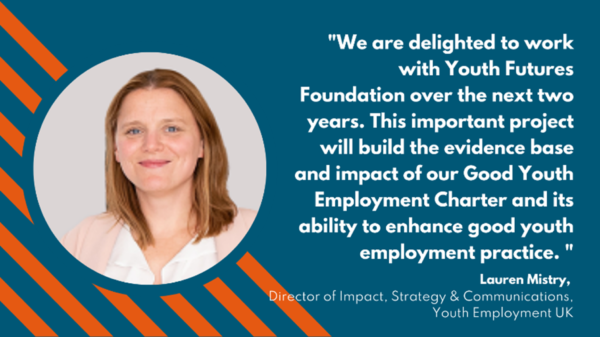Today, 8th May 2022, Youth Futures Foundation announces its latest round of grant funding to boost the provision of youth employment support for young people from marginalised backgrounds.
Seven intermediary organisations in England will benefit from £1.35million from the second phase of its Infrastructure Fund. More successful applicants will be announced in the coming months.
The first phase of the fund is already supporting 11 grantees to reach their network of 4,081 membership organisations to provide improved support and pathways to employment for young people. This latest announcement brings the total Youth Futures grant funding and evaluation commitments to £23.5million, to support nearly 18,000 young people.
Organisations set to benefit from phase two of the fund include ERSA, The Ubele Initiative, London Progression Collaboration, Carers Trust, DFN Project SEARCH, Youth Employment UK and Action for Race Equality.
This vital financial commitment comes at a time as the cost-of-living crisis is hitting vulnerable young people hard. They pay double for essentials like rent and bills, compared to the over-50s. An effective way to tackle this is by supporting them to secure good quality jobs.
Currently, one in 10 young people in the UK are out of employment (NEET), education or work. According to research by PwC and Youth Futures, UK GDP could benefit by £38billion by lowering levels of young workers classed as NEETs to German levels.
The aim of Youth Futures funding, from Dormant Assets, is to test and evidence the best approaches to breaking down barriers and improving access to employment for young people from marginalised backgrounds.
RAND Europe, a not-for-profit research organisation, is evaluating the Infrastructure Fund and generating learning to be published in the coming months. It will continue to support this latest round with a budget of £300,000 to analyse how Infrastructure organisations work in the youth employment space. The findings will be shared across the youth sector and with national and local policymakers to inform and scale up effective practice and policy.
Patricia Chale, interim CEO, Youth Futures Foundation said:
“I am delighted with the breadth of organisations we will be working with and the young people they will reach. This demonstrates the value of using Dormant Assets to scale up effective youth employment support at a time when the cost-of-living crisis is hitting young people hard. A sustainable way to reduce the impact of rising prices is to support them to secure good jobs.”
“At this significant milestone for Youth Futures, I’d like to thank our founding Chair, Joe Montgomery, for his tireless work in guiding Youth Futures through the youth employment crisis following the completion of his three-year tenure.”
Jeremy Crook, Chief Executive of Action for Race Equality said:
“Action for Race Equality (ARE) (Action for Race Equality) are pleased to be working with Youth Futures Foundation over the next two years to strengthen the work of and attract more investment for small organisations led by those from Black, Asian and mixed heritage backgrounds within the Employability sector.
“A stronger sector will mean more positive opportunities for Black, Asian and mixed-heritage young people including jobs, apprenticeships or work placements. We will be providing opportunities for the sector to share best practice, develop partnerships, champion positive-action interventions with employers and build their capacity. A key component of this programme will be our Youth Panel: ensuring the voices and perspectives of young people will always be embedded throughout this work.”
Claire Cookson, Chief Executive Officer, DFN Project SEARCH said:
“We’re delighted to work alongside the Youth Futures Foundation on our ‘Bridging the Gap’ initiative, which will break down the barriers and misconceptions that young adults with learning disabilities or autism spectrum conditions face on a daily basis around access to employment. Through our wealth of data and first-hand insight, our aim is to improve best practice across the board, showcasing the amazing talent these young adults have, and how policy needs to change to encourage the best form of inclusive recruitment.”
Michael Hamilton, Director of Practice, The Ubele Initiative said:
“The Ubele Initiative is looking forward to working with local organisations to build and enhance an effective employment support structure for Black and minoritised young people.”
Anna Ambrose, Director, London Progression Collaboration, IPPR said:
“We’re delighted to be working with Youth Futures Foundation over the next two years. Their support will allow the London Progression Collaboration to continue to build on our successful pilot, and to develop our work supporting small and medium-sized businesses to create high-quality apprenticeship opportunities which support disadvantaged young Londoners to progress into and in work. It will also give us the opportunity to pilot a new programme of training for apprentices’ line managers to boost the impact of apprenticeships on young learners, and to give our network of employers and training providers more opportunities to connect and share expertise and insights. With apprenticeships proven to deliver the greatest dividends for the most disadvantaged learners, we’re excited about the impact this work with our network will have on the opportunities available to disadvantaged young Londoners.”
Lauren Mistry, Director of Impact, Strategy & Communications, Youth Employment UK said:
“We are delighted to work with Youth Futures Foundation over the next two years. This important project will build the evidence base and impact of our Good Youth Employment Charter and its ability to enhance good youth employment practice, understanding the exploration, experience and employment activities that drive better recruitment and retention of all young people but with particular attention for those most marginalised.”
Vicky Morgan, Head of Young Carers and Young Adult Carers, Carers Trust, said:
“Thanks to Youth Futures Foundation’s support, Carers Trust will be able to convene employers, practitioners and wider stakeholders to build an evidence base of ‘what works’ and drive improvement across the youth employment sector, levelling the playing field for young carers and young adult carers.”







